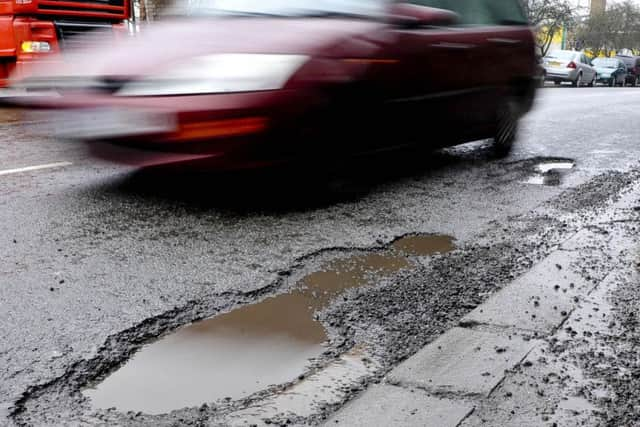Jayne Dowle: Potholes bring misery to drivers - something must be done about them
Catherine West, the Labour MP for Hornsey and Wood Green in North London, told BBC News that just one per cent of the HS2 budget would go a long way towards mending the roads. Her colleagues, who only last week recommended urgent action on air pollution, should take note; she also pointed out that the government would never be able to meet its targets on clean air unless it makes cycling to work a safer option for people.
Potholes to pollution? At first glance it’s difficult to see the connection, but this is how ministers must start to join the dots if they are serious about improving the environment. And save lives.
Advertisement
Hide AdAdvertisement
Hide AdMs West has been doing her research. And according to figures she’s obtained through a Parliamentary answer, the number of cyclists killed or seriously injured because of badly maintained roads has more than trebled since 2007.


In 2007, there were two fatalities and 15 serious injuries where the state of the road was a “contributory factor” - compared with four fatalities and 60 serious injuries in 2016. And these are only the accidents which are reported to the emergency services. There are countless injuries and wrecked bikes never officially acknowledged; who knows the cost of this, both in personal terms and to the British economy?
I happen to be very familiar with the roads around Ms West’s parliamentary constituency, because Wood Green is where I passed my driving test a quarter of a century ago. Since that nerve-wracked morning, I have driven hundreds of thousands of miles around Great Britain, from Salcombe in Devon to the Isle of Skye in Scotland. And I can honestly say that I have never seen the roads in such a shocking state.
I’m not talking about motorways, but the A roads and minor roads which connect town to town, village to village. Sometimes, I’m given to wondering whether some of my local byways are more dangerous now than they were in the days of stagecoach travel. In my part of South Yorkshire in the 18th century, local taxes were raised to pay for repairs and villagers were expected to give their labour for free to carry them out.
Advertisement
Hide AdAdvertisement
Hide AdIf things carry on as they are around here, we’ll all be out with our shovels and buckets of tarmac. It’s getting to the stage where I’m planning my route to avoid the biggest holes and most treacherous stretches of road.


I’m sure I’m not the only motorist taking such aversive action. All this does is put more pressure on the roads still fit to travel on. And, well, you don’t need me to spell out the consequences in terms of traffic congestion, concentrated pressure on yet more road surfaces and general chaos and deterioration.
Potholes are the biggest problem –literally – buckling wheels and tyres, wrecking suspension and making it impossible to steer in a straight line. The recent freezing weather has made matters worse. And now we learn that as many as one in eight local roads could be closed to traffic within a year because of a huge backlog of pothole repairs. The Asphalt Industry Alliance’s annual study says that 20 per cent of roads in England and Wales have less than five years of serviceable use.
Affected roads will need extensive repairs, including complete resurfacing in some areas, and could be decommissioned. The report acknowledges that central government investment in local roads - about £1.2 billion a year - is at its highest level in a decade. However, council officials say that years of underfunding had created a “tidal wave of deterioration” that has left many roads in a critical condition.
Advertisement
Hide AdAdvertisement
Hide AdLocal roads are so neglected that they are resurfaced only every 78 years on average, the study found, rising to every 132 years for minor unclassified roads in England. 132 years? And you think I’m joking about going back to the days of the stagecoach.
It’s clear that any funding available is considered too little, too late. And guess what? Once again, the North of England gets a raw deal. The experts say that councils need an extra £555.7 million a year simply to manage day-to-day maintenance, but authorities in the north receive a third less than those in the south. If one of our Yorkshire and Humber MPs would like to take up this point and start asking some Parliamentary questions too, I’d be interested to hear the answers given by the Secretary of State for Transport, Chris Grayling.
Meanwhile, in response to my own question, I’ll say this. HS2 would be nice, I’m sure. But there’s no point having a high-speed train if we can’t drive or cycle to the station to catch it.